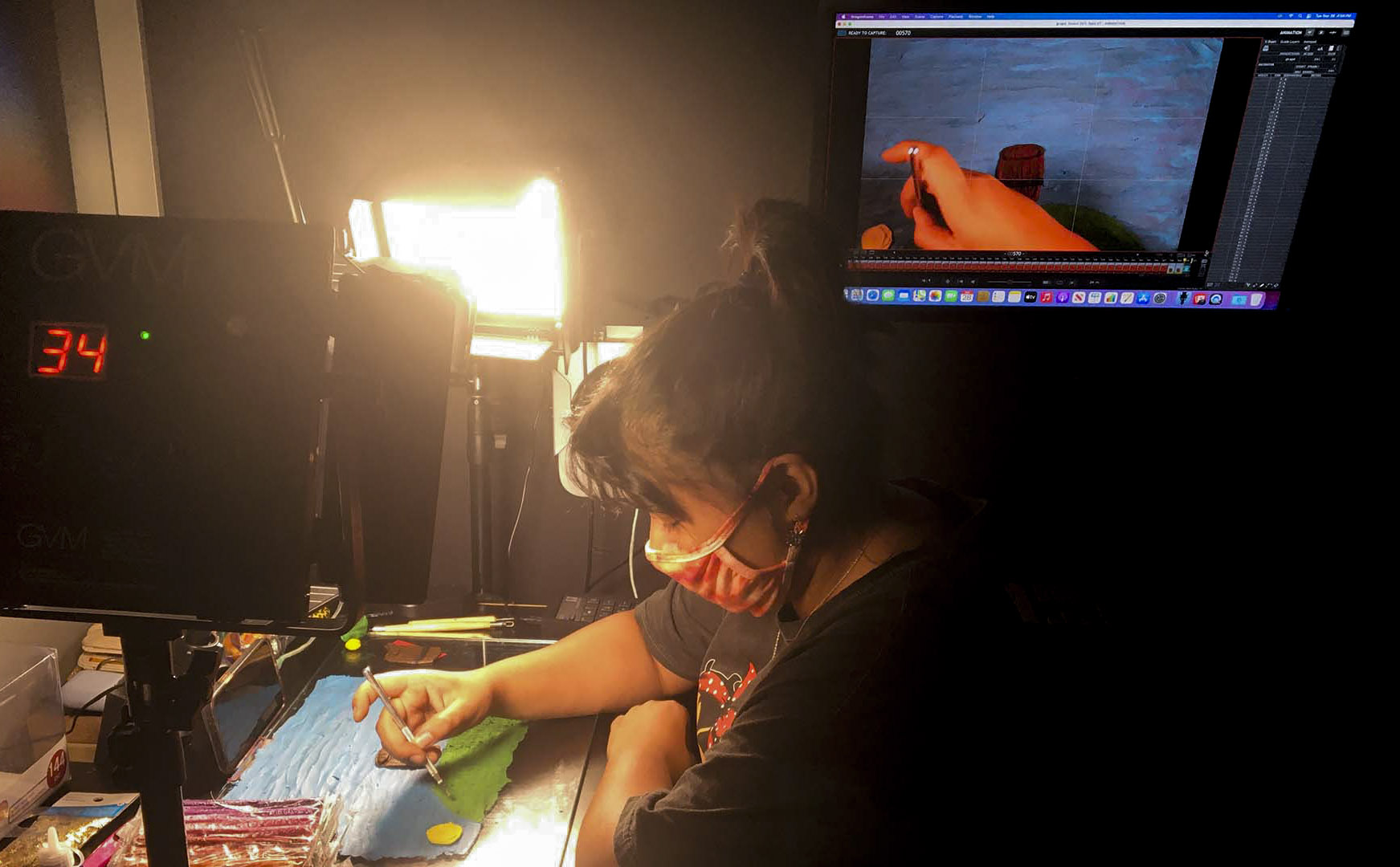Animation Graduate Programs
Explore current methods of animation, visual effects production, and their historical and cultural contexts.
The MFA in Arts, Technology, and Emerging Communication focuses primarily on the creative use and critical investigation of technology in artistic practices. This terminal degree program is designed both for students wishing to teach arts and technology-related courses at the college level and for those intending to engage in a professional studio or design practice. We emphasize creating and applying computer-based arts and narrative, while we maintain a commitment to an interdisciplinary education that fuses critical thinking with creative thinking.
Master of Fine Arts in ATEC: Animation Pathway
Students in the MFA in ATEC: Animation Pathway explore current methods of animation, visual effects production, and their historical and cultural contexts. Our courses enhance students’ artistic vision by developing their skills across the production pipeline in 3D, 2D, and experimental techniques. As a result, our students are encouraged to expand their creative aesthetic and problem-solving skills, preparing them for professions in the entertainment industry as well as university faculty positions.
The typical timeline to graduation is three years. In their first year, Animation MFA students take courses in animation aesthetics and histories, which anchors their subsequent coursework in creative inquiry and production practices. After a combination of prescribed and free electives, including the opportunity to take courses outside ATEC, in their third year, Animation MFA students devote their time to creating their final capstone project. An MFA student at ATEC also can expect to be introduced to or further explore the vibrant Dallas arts scene, with which our faculty and students are heavily engaged. MFA students also have opportunities to serve as teaching assistants to develop their pedagogical skills.
In addition to working closely with our award-winning faculty, MFA students join a cross-disciplinary cohort of graduate students pursuing creative and critical forms of inquiry. All graduate students have the opportunity to participate in ATEC’s interdisciplinary lab spaces, including those dedicated to animation, and each year ATEC hosts various showcases featuring students’ work. Our Animation MFA students have gone on to careers in the animation industry and in academia.
To learn more about our MFA in ATEC: Animation pathway, attend a Graduate Studies Overview Session. During these information sessions, our academic advisors provide an overview of our programs, the application and admissions process, funding opportunities, and are available to answer your questions. You also can learn more about graduate degree program policies and procedures here: List of Graduate Degree Program Policies and Procedures.
| Program Type | Master’s |
| Format | On campus, full- and part-time options are available |
| Estimated Time to Complete | 3 years |
| Semester Credit Hours | 54 |
Admission and Funding
Applications to the MFA program must be turned in no later than January 15 for priority consideration for admission and funding. Should space remain, the Bass School will continue to accept applications in accordance with University deadlines until the “Regular Application and Documentation Deadline.” For the “Late Application and Documentation Deadline,” students must begin their new applications by August 1. Students are admitted for a fall semester start.

Meet Professors You Will Never Forget
ATEC Faculty include world-renowned artists, scholars, and creative practitioners. Their diverse areas of expertise ensure that graduate students gain knowledge of breadth and depth. Our professors publish with the nation’s leading academic presses, work with top animation studios, hold patents in design, and are recognized as pioneers by peers in their field.
Areas of Faculty Work & Exhibition
3D computer animation; 3D modeling; 3D printing and projection mapping; digital fabrication; digital media and interactive art; documentary; games; new media art; photography and contemporary art; simulations
Areas of Faculty Research & Publishing
Applied media studies and remix culture; border studies; critical ethnic and race studies; critical making; digital humanities, including digital health humanities; disability and crip studies; feminist studies; game studies; infrastructure studies; literary studies; media studies and cinema studies; mobile media; new media arts and new media arts and education

Art-Based Research & Creative Practice
We believe if you can imagine it, we can make it. Our lab and studio culture blends art, technology, design, engineering, science, and the humanities to create an incubative environment rich with possibilities. Collaboration is the heart of the Bass School. Learn how faculty, students, art-based research, and creative practice are connected.
Contact Information
Sean McComber
Assistant Professor and Area Head
Phone: 972-883-7505
Email: sxm129130@utdallas.edu
Office: ATC 3.101P
Katherine Schweers
Graduate Academic Advisor
Phone: 972-883-6324
Email: katherine.schweers@utdallas.edu
Office: ATC 1.602
Graduate Advising
Bass School of Arts, Humanities, and Technology
The University of Texas at Dallas, JO31
800 W. Campbell Road
Richardson, TX 75080-3021
Phone: 972-883-4706
Email: ahtgradvising@utdallas.edu
Office of Admission and Enrollment
800 W. Campbell Road
Richardson, TX 75080-3021
972-883-2270 or 1-800-889-2443
admission@utdallas.edu
utdallas.edu/enroll
MFA Application Deadlines
| Jan 15 | deadline to turn in all application materials1 |
| May 1 | regular application deadline |
| Aug 1 | deadline to start application |
Deadline to turn in all late application materials is in accordance with University deadlines.
1 for Priority Consideration for Admission and Funding